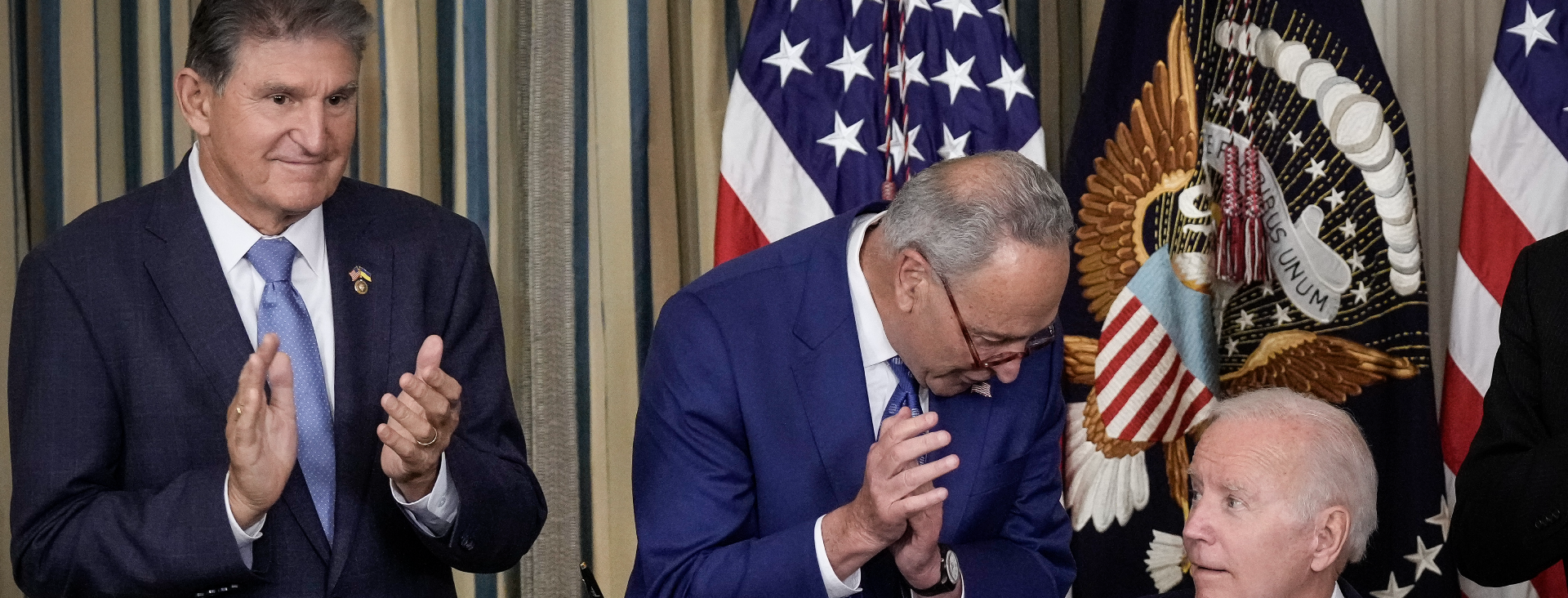Climate Activists Move to Block Manchin's Pipeline Bill

Just days after Pres. Joe Biden signed the Inflation Reduction Act (IRA) into law, environmental justice groups are now mobilizing to block a pipeline bill that was promised to Sen. Joe Manchin (D-WV) in return for his support of the IRA.
Manchin backed the IRA only after Sen. Maj. Leader Chuck Schumer (D-NY) agreed to a side deal in which Democratic leaders would support a follow-up bill, expected to come next month, that would ease the permitting process for natural-gas pipelines.
House progressives have already expressed skepticism about signing off on the side deal, with Roll Call quoting Rep. Henry Cuellar (D-TX) as saying, “[S]ome Democrats are not going to support it.” Reps. Raul Grijalva (D-AZ), chair of the Natural Resources Committee, and Pramila Jayapal (D-WA), who heads the Congressional Progressive Caucus, were said to be uncommitted, pending details of the side-deal legislation.
If House Democrats block Manchin’s side deal, it would be an ironic reversal of last year, when progressives reluctantly agreed to join Manchin in passing infrastructure legislation first, after Biden promised they would get the full Build Back Better bill later. Then Manchin torpedoed Build Back Better.
Now, progressives may be in position to return the favor. And environmental activists say they’re working to line up enough progressive support to kill the Manchin side deal. As Politico reported this morning, some groups are privately lobbying members of Congress. Now, they’ve told TYT that they’re going to take the fight to the public.
According to Juan Jhong-Chung, climate justice director of the Michigan Environmental Justice Coalition, climate justice organizations will gather in Washington, DC, on Sept. 8 for a solidarity action they’re calling "Appalachian Resistance Comes to DC."

The rally, organized by the Stop MVP Coalition and People vs. Fossil Fuels, is targeted at the Mountain Valley Pipeline, which Manchin has supported, and at blocking the more lax permitting in Manchin’s bill, as revealed in leaked draft legislation obtained by Bloomberg. Jhong-Chung says the bill points to more harm being done to Black, Brown, and Indigenous communities and undermines the National Environmental Policy Act (NEPA) and the Clean Water Act - two pieces of policy he says frontline communities depend on to protect themselves against pollution.
Jhong-Chung said, “[What] we saw in the leaked documents, basically, this so-called permitting reform was trying to expedite and fast-track fossil fuel projects. It was also fast-tracking pipelines for carbon capture - so: carbon dioxide pipelines as well as hydrogen pipelines. So it's really concerning because we know the current administration and also a lot of industry players, instead of transitioning to wind and solar... are using these unproven technologies, and the harms are going to be there by EJ [environmental justice] communities, like those pipelines are going to be built near our neighborhoods, all of the pollution is going to stay here.”
The Biden administration and a host of environmental groups maintain that any compromises made to pass the IRA are worth the benefits. On Thursday afternoon, the White House released a fact sheet summarizing the IRA’s benefits for Indigenous communities. Similar releases have touted the IRA’s upsides for other communities, as well.
But some environmental justice groups have criticized White House characterizations of the bill. Money counted as going toward Black, Brown, and Indigenous communities, for instance, might not be allocated solely for them.
The Michigan Environmental Justice Coalition, the Climate Justice Alliance, and UpRose (an advocacy group led by women of color) did an in-depth analysis of the IRA’s provisions. As a result, Jhong-Chung said, “We think that the $60 billion count is actually double-counting many EJ provisions. The only things that should count as EJ investments should be designated entirely for low-income and disadvantaged communities. A lot of that money will not go explicitly to our communities.”
And while stakeholders from climate justice organizations representing Black and Brown communities were consulted during the initial crafting of the massive Build Back Better plan, Jhong-Chung and other activists say they were largely left out of negotiations when Manchin and Schumer pared it down to the IRA.
Jhong-Chung told TYT, “We don't believe that the Democrats owe Joe Manchin anything with the IRA; meaning, Black, Brown and poor communities and Indigenous communities have been sacrificed already. So for us, this permitting side deal would be another slap in the face. We will be extremely vulnerable to polluting projects like fossil fuel development.”
The side deal, Jhong-Chung said, “was a huge red flag because it is actually undermining two really important pieces of policy that a lot of Black, Brown, Indigenous and poor communities rely on to protect ourselves from pollution and those are the National Environmental Policy Act, NEPA, and also the Clean Water Act. We saw that in the leaked documents.”
As for the Sept. 8 rally, Jhong-Chung said, “We are planning to have a strong solidarity action on September 8th in DC to show support for our Appalachian siblings who are fighting that Mountain Valley Pipeline.”
TYT Washington Correspondent Candice Cole was previously a correspondent and senior White House producer for the Black News Channel and has worked at a number of local news outlets. You can find her on Twitter @CandiceColeNews.
